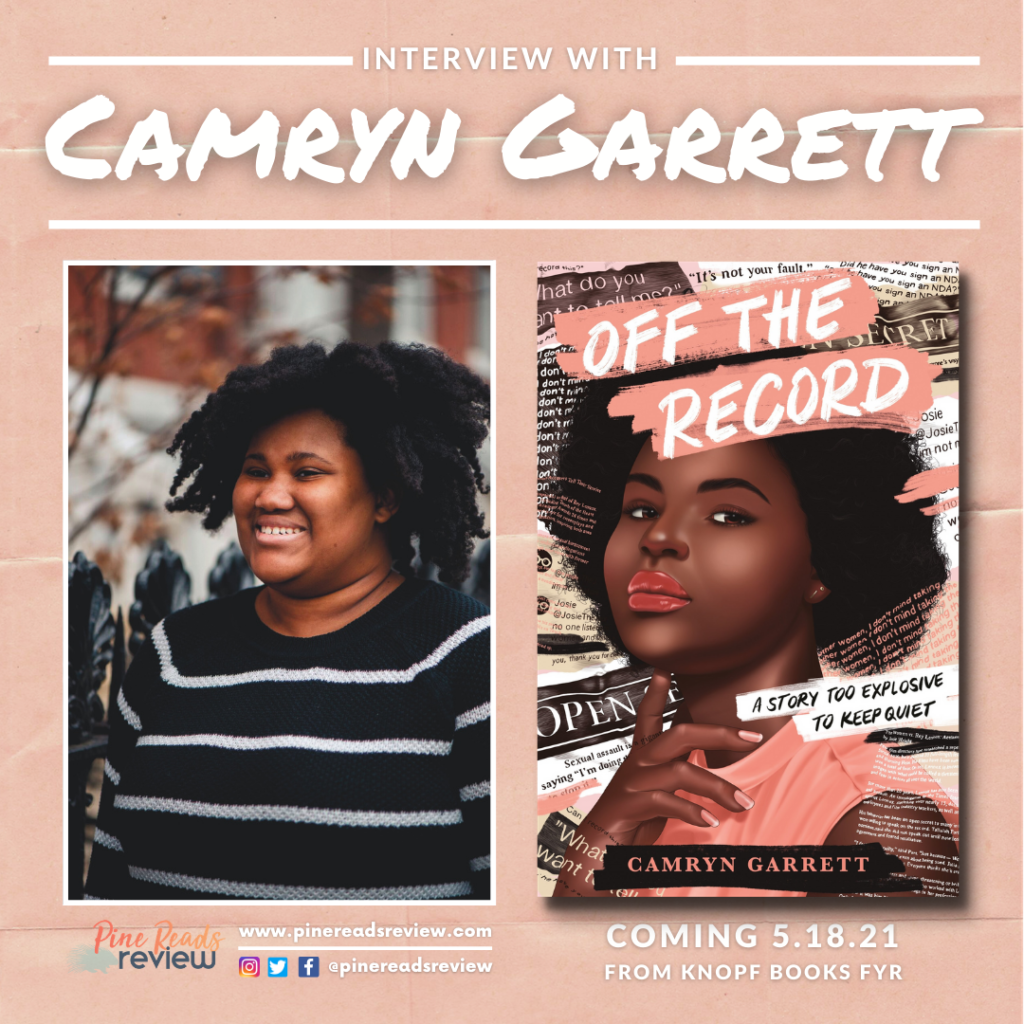
About the Author: “Camryn Garrett grew up in New York and began her writing career at thirteen, when she was selected as a TIME for Kids reporter, interviewing celebrities like Warren Buffett and Kristen Bell. Since then, her writing has appeared on MTV and in the Huffington Post and Rookie magazine, and she was recently selected as one of Teen Vogue‘s “21 Under 21: Girls Who Are Changing the World.” When she’s not writing, she studies film at NYU, and she’s a proud advocate for diverse stories and storytellers in any medium. Her first novel, Full Disclosure, received rave reviews from outlets such as EW, Glamour and SLJ, which said in its starred review, “Readers will fall in love.” Off the Record is her second novel.” (Bio provided by author’s publisher).
Find Camryn Garret on the following platforms:
A huge thank you to Camryn Garrett and her publicist, Lili Feinberg, for making this interview possible! Read on for a discussion on writing, representation, and Camryn’s two incredible novels, Full Disclosure (out now) and the upcoming Off the Record (coming May 18th, 2021).
Camryn Garrett: I wrote the second book before I even started edits on the first book, so it was a really self-indulgent process, at least writing the first draft! Lots of authors talk about how difficult the second book is to do, so I feel like I got to bypass that. I felt pretty confident, way more than I do now. 🙂
CG: It’s funny because I was more confident about my sexuality when I was writing the book, but had almost inklings of the same feelings that Simone had about not being queer enough or knowing if she was “allowed” to identify as bi. Now that I’m really up in the air about my sexuality and feel more confused, I’m really glad that I wrote a character like that.
CG: I am a fan of musicals! I grew up in a suburb of New York City, so going to Broadway to see a show was a big thing my family did or even a cool field trip we got to do. I really loved The Prom; it was so much fun to see on stage, before the movie came out! We sat behind a school from Indiana, where the show was set, and it was tons of fun to see their reactions.
CG: I don’t really think so! But this is sort of a pattern for me that I do with other books. I think life has lots of heavy moments, but there are always positives and great moments, and I personally find it hard to get through books without them.
CG: Rejection is hard! But mostly, I think it’s super hard to figure out how to revise on your own when you don’t have an agent/editor/that one person whose opinion you completely trust. I write screenplays too and that’s something I struggle with on that end, too. Critique partners are great, but in the quest to get feedback, you’re bound to get a lot of conflicting notes. It can be hard to tell which ones work best.
CG: Yes!!!! YES! I’ve written a lot of first drafts that I actually don’t want to move forward with, which is very, very new for me. Usually, once I’ve reached the 30k word mark I know the book is safe, but it just hasn’t been the case this year. It’s super hard. I’ll have droughts where I don’t have any ideas and then moments where I have a ton, but none of them stick after a week. I’m trying to take it one day at a time.
CG: I wrote the beginning of an MG last year and I think it fell apart due to the pandemic brain fog, honestly. And I was really adamant about writing an adult novel earlier this year, although I don’t feel the urgency anymore (I might again in a few months, ask me later!). I’m balancing school with writing right now, so I think I’m trying to remind myself that I don’t have to do everything all at once. But yeah, especially with Beverly Cleary passing, I’ve been reminiscing on the books that shaped me when I was younger and really want to tap into that.
CG: I wrote the first draft in 2019, which I think was the height of the media attention on the movement, so it was sort of everywhere. I really wanted to reckon with the way the movement forced me to rethink aspects of my own life, whether it be interactions I later realized were really inappropriate or ways I interacted with movies made by dangerous people. Writing was a great way to work through all of that.
CG: Many! I started reading graphic novels, and the Heartstopper series by Alice Oseman made me so happy and gave me so much hope. The Secret Lives of Church Ladies was quite possibly the best book I read in 2020, but I also loved The Black Kids by Christina Hammonds Reed, which was so amazing and so far from what I had been expecting. I recently read Perfectly Parvin by Olivia Abtahi, which comes out the same day as Off the Record, and I want it to be made into a TV show immediately! Writers and Lovers by Lily King is getting adapted by Toni Collette and I’m so so happy; it’s been one of my favorite books of 2021!
PRR Writer, Grace Kennedy